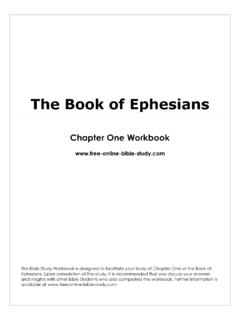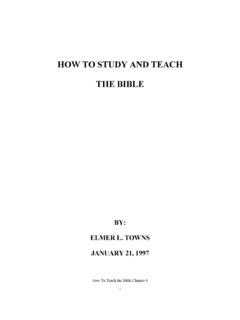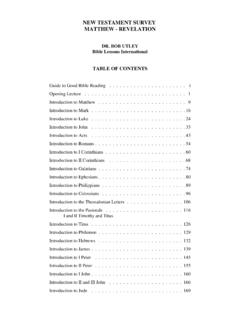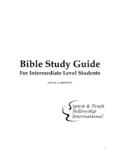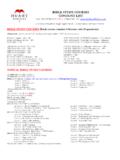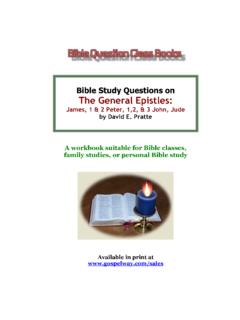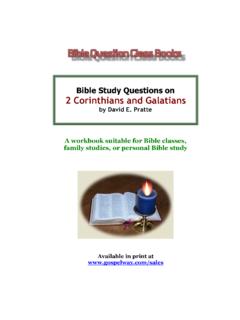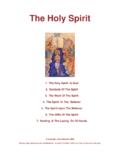Transcription of Basic 4 Bible Study Method - The Crossing Church
1 Basic 4 Bible Study Method The purpose of studying Scripture is to allow the Holy Spirit to use God s Word to transform our lives. The mere accumulation of knowledge without transformation leads to pride and emptiness. Do not merely listen to the word, and so deceive yourselves. Do what it says. James 1:22 NIV The Basic 4 asks the following important questions regarding the Scripture being studied: 1. Observation: What does it say? 2. Interpretation: What does it mean? 3. Correlation: How do other Scriptures relate to and explain this one? 4. Application: How does this apply to me? OBSERVATION: Good observation comes from carefully reading Scripture, looking in detail at every sentence and word and then writing down everything you see. You are trying to answer the question, What does it say? The purpose of observation is to saturate yourself completely with the contents of a Bible passage using diligence, patience, asking many questions and writing down everything you see.
2 Basic questions to ask are: What? Why? When? How? Where? Who? Key things to look for are: Key words Repeated words or phrases Questions being asked Answers being given Commands Warnings Comparisons things that are alike Contrasts things that are different Illustrations Causes and effects and reasons for doing things Promises and their conditions for fulfillment List of things Results Advice, admonitions, and attitudes Tone of the passage Explanations Old Testament quotes in the New Testament Literary form Paradoxes (irony) Exaggerations or hyperboles Use of current events of the times Anything unusual or unexpected INTERPRETATION: After observing all you can in the passage, you are ready to move on to interpretation. This step involves asking questions about meaning, then trying to find answers to them. Interpretation helps you discover the biblical writer s purpose and message.
3 Interpretive questions include asking what or why. The following are some examples: Why did the writer say this? What is the meaning of _____? What is the significance of _____? What is the implication of _____? Why is this important? Note: As you are writing down your questions, make a note of things you would like to have answered in the future or things you d like to use for future Study at a later date. After you have listed all your questions of interpretation, you need to start finding some answers. You can find free online Bible Study tools at: 1. Check the context. Always interpret a passage in light of its context. The answers to your questions can often be found in the verses preceding or following the text you are studying. You can avoid a great deal of misinterpretation by first checking out the context of a verse. Answer the following questions: a.
4 Who is speaking? b. Who is being spoken to? c. When is it being spoken? d. Where is it being spoken? e. What is the occasion of circumstance? f. What is the main subject of the message? g. Is the aim of what is being said revealed? h. What other background material clarifies this statement? 2. Define key words. Look up important words in a Bible dictionary, concordance and/or lexicon. Understanding words in their original language and how a word was defined and used at the time it was written will help you more accurately interpret Scripture. 3. Compare several translations of the text. Use different versions of the Bible to see how the various translators rendered a particular word, phrase or paragraph. Three suggested translations are: a. New International Version (NIV - 1984) b. New Living Translation (NLT) c. New American Standard Bible (NASB) 4. Study the background of the text.
5 Interpret your text in light of the historical, cultural, geographic, economic, social and political backgrounds of the book, including the current events of that time. 5. Consult a commentary. There is a place for commentaries in Bible Study , but it comes only after you have done your own work. Compare your findings with those of found in various commentaries. If you can t find any that agree with you, you most likely came up with an incorrect interpretation. CORRELATION: This step involves finding cross-references for the verses in your Study in order to further explain the meaning of the text. It is based on the principle of interpretation that says, The Bible interprets itself; Scripture best explains Scripture. You can often interpret passages that are not clear by passages that are. Ask the question, How do other Scriptures relate to and explain this one? basics steps in cross-referencing: 1.
6 First, look for cross-references within the same book you are studying. This is internal correlation. 2. Second, compare statements in other writings by the same author. This is external correlation. 3. Then, compare with other books in the same testament. 4. Finally, compare references in all of Scripture. You can find cross-references in a Study Bible or reference Bible or by looking up similar words in a concordance. Types of cross-references: The pure cross-reference. This is sometimes called the parallel cross-reference because it says almost exactly the same thing as the verse you are analyzing. The illustrative cross-reference. This type, which may involve a real event or person in history, illustrates what the verse you are studying is saying. The contrasting cross-reference. This type says the opposite of what your verse says. It may look like a contradiction, but it is actually approaching the subject from a different viewpoint.
7 APPLICATION: The purpose of Bible Study is to be transformed by God s Word. Personal application will never contradict the pervious three steps; that s why it comes last. The objective truth of God s Word always precedes and supersedes any application. This way, God s Word defines my life, rather than my personal experiences defining God s Word. Depending upon length and content of your particular Study , there may be a multitude of personal applications. It is better to record just one or two and fully apply that truth in your life than to write down several applications and then fail to implement any of them. The following acrostic may help you to apply God s Word in your life: S-P-A-C-E P-E-T-S Sin to confess? Promise to claim? Attitude to change? Command to obey? Example to follow? Prayer to pray? Error to avoid? Truth to believe? Something to praise God for?
8 Write down your personal application. Doing so helps you to be specific, it helps you to remember it, and it helps you to be held accountable to it. There are three factors to writing a good personal application: 1. Personal your application must be personal. Write it in the first person using words like: I, me, my, and mine. (Example: I need ) 2. Practical your application must be practical. It must be something you can actually do. Be as specific as possible and plan a definite course of action that you intend to take. Be a doer of the Word. (Example: I need to pray with my wife each morning before leaving the house and pray with our children every night at bedtime.) 3. Provable your application must be measurable so you ll know when you ve accomplished it. (Example: Starting this date _____, I commit to praying with my wife every morning before leaving the house and with our children every evening at bedtime.)
9 To help hold you accountable to the commitment you are making, tell a friend or family member about it who will occasionally check up on your progress in an encouraging way. * Portions of the above information were taken from and Rick Warren s Bible Study methods Zondervan Publishing.
